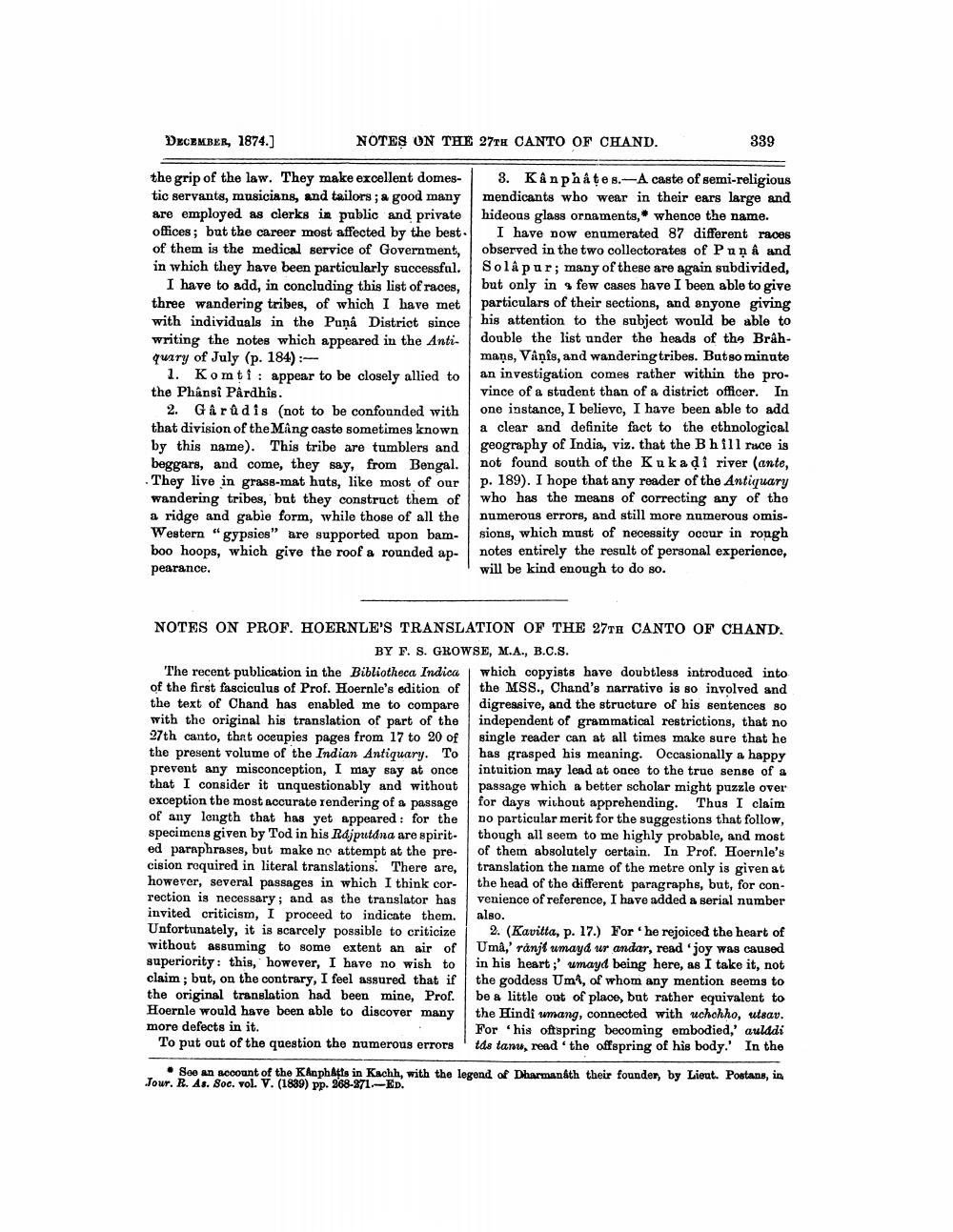________________
DECEMBER, 1874.]
NOTES ON THE 27TH CANTO OF CHAND.
339
the grip of the law. They make excellent domes- 3. Kanphates.- A caste of semi-religious tic servants, musicians, and tailors; a good many mendicants who wear in their ears large and are employed as clerks in public and private hideous glass ornaments, whence the name. offices; but the career most affected by the best. I have now enumerated 87 different races of them is the medical service of Government, observed in the two collectorates of Pun å and in which they have been particularly successful. Solapur; many of these are again subdivided,
I have to add, in concluding this list of races, but only in few cases have I been able to give three wandering tribes, of which I have met particulars of their sections, and anyone giving with individuals in the Puņá District since his attention to the subject would be able to writing the notes which appeared in the Anti- double the list under the heads of the Brâhqurry of July (p. 184) :
mans, Våņis, and wandering tribes. Butso minute 1. Komti: appear to be closely allied to
an investigation comes rather within the prothe Phansi Pârdhis.
vince of a student than of a district officer. In 2. Garudis (not to be confounded with one instance, I believe, I have been able to add that division of the Ming caste sometimes known a clear and definite fact to the ethnological by this name). This tribe are tumblers and geography of India, viz. that the Bhill ruce is beggars, and come, they say, from Bengal. not found south of the Kuka di river (ante, They live in grass-mat huts, like most of our p. 189). I hope that any reader of the Antiquary wandering tribes, but they construct them of who has the means of correcting any of tho a ridge and gabie form, while those of all the numerous errors, and still more numerous omisWestern "gypsies" are supported upon bam
sions, which must of necessity occur in rough boo hoops, which give the roof a rounded ap- notes entirely the result of personal experience, pearance.
will be kind enough to do so.
NOTES ON PROF. HOERNLE'S TRANSLATION OF THE 27TH CANTO OF CHAND.
BY F. S. GROWSE, M.A., B.C.S. The recent publication in the Bibliotheca Indica which copyists have doubtless introduced into of the first fasciculus of Prof. Hoernle's edition of the MSS., Chand's narrative is so involved and the text of Chand has enabled me to compare digressive, and the structure of his sentences 80 with the original his translation of part of the independent of grammatical restrictions, that no 27th canto, that occupies pages from 17 to 20 of single reader can at all times make sure that he the present volume of the Indian Antiquary. To has grasped his meaning. Occasionally a happy prevent any misconception, I may say at once intuition may lead at once to the true sense of a that I consider it unquestionably and without passage which a better scholar might puzzle over exception the most accurate rendering of a passage for days without apprehending. Thus I claim of any length that has yet appeared : for the no particular merit for the suggestions that follow, specimens given by Tod in his Rajputana are spirit- though all seem to me highly probable, and most ed paraphrases, but make no attempt at the pre- of them absolutely certain. In Prof. Hoernle's cision roquired in literal translations. There are, translation the name of the metre only is given at howerer, several passages in which I think cor- the head of the different paragraphs, but, for conrection is necessary; and as the translator has venience of reference, I have added a serial number invited criticism, I proceed to indicate them. also. Unfortunately, it is scarcely possible to criticize 2. (Kavitta, p. 17.) For he rejoiced the heart of without assuming to some extent an air of Uma,' ranji umayd ur andar, read joy was caused superiority: this, however, I have no wish to in his heart;' umayd being here, as I take it, not claim; but, on the contrary, I feel assured that if the goddess Umi, of whom any mention seems to the original translation had been mine, Prof. be a little out of place, but rather equivalent to Hoernle would have been able to discover many the Hindi mang, connected with uchchho, utsav. more defects in it.
For his oftspring becoming embodied,' aulddi To put out of the question the numerous errors tds tanu, read the offspring of his body. In the
• Soo an account of the K AnphAfts in Kachh, with the legend of Dharmanath their founder, by Lieut. Postans, in Jour. R. As. Soc. vol. V. (1839) pp. 268-871.-ED.




